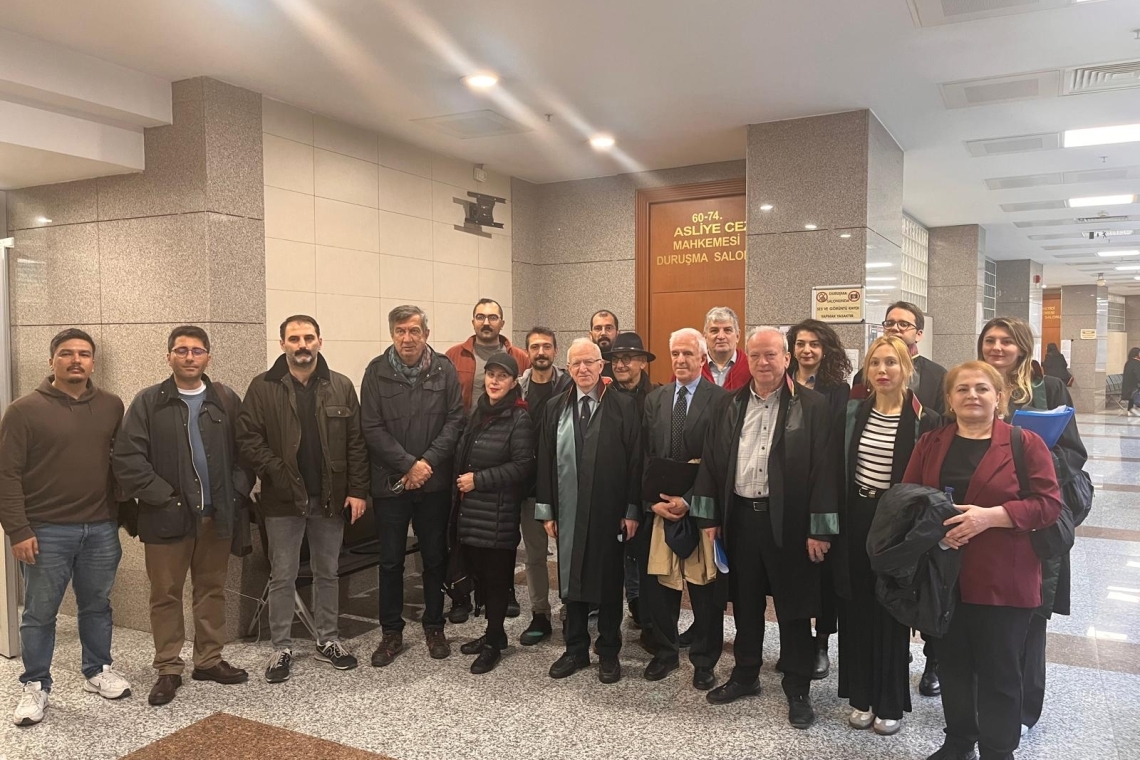Semra Pelek
Journalist and BirGün columnist Zafer Arapkirli appeared in court Tuesday in Istanbul on charges of “insulting the president” over a social media post. Arapkirli called the case politically motivated and said, “There is a complaint here, but no crime.”
The trial opened at Istanbul’s 60th Criminal Court of First Instance and was attended by prominent observers including Istanbul Bar Association President İbrahim Kaboğlu, Turkish Journalists’ Association Secretary-General Sibel Güneş, a Media and Law Studies Association (MLSA) monitor, and several journalists.
Post on X triggers investigation with ministry approval
The case was initiated following a post on X (formerly Twitter) by pro-government columnist Cem Küçük, who reported Arapkirli for his October 23, 2024 social media post, which read: “You’re a terrible screenwriter... You’ve always been that way.” The indictment was prepared with the authorization of the Ministry of Justice under Articles 299/1 and 299/2 of the Turkish Penal Code, which criminalize insults against the president.
Arapkirli: “This is a political case meant to silence”
In his defense statement, Arapkirli denied the charges and argued that the case was politically driven:
“This is a trial based on a report and complaint, but there is no crime. This is a political case. A minor informant, feeding off the regime, is trying to assist in scoring political points with slander.”
The 68-year-old journalist said he has spent 48 years in the profession:
“I’ve always fought against the establishment, authoritarian regimes, and anti-democratic practices. I’ve lived without fear. My revolutionary inspiration comes from Atatürk, and my determination from the tradition of struggle led by Deniz Gezmiş and Mahir Çayan.”
Bar association president: Article 299 is no longer justified
Speaking for the defense, Istanbul Bar Association President İbrahim Kaboğlu argued that Article 299 should no longer be applicable, as the president is no longer a neutral figure:
“Following the 2017 constitutional amendments, the president became both the head of the executive branch and the leader of a political party. Article 299, which envisions protecting a neutral arbiter, contradicts this new system.”
Kaboğlu also referenced the European Court of Human Rights’ ruling in Vedat Şorli v. Turkey and requested that the court formally ask the Ministry of Justice and the Turkish Parliament whether they plan to revise Article 299.
Defense lawyers question legitimacy of investigation
Another defense attorney, Deniz Yazgan, said the investigation was based on assumptions stemming from Cem Küçük’s report:
“The investigation was flawed from the beginning. There is no evidence. The European Court of Human Rights has held that giving special protection to heads of state is incompatible with freedom of expression.”
Yazgan added that the phrase “You’re a terrible screenwriter” does not constitute a crime, even if directed at the president, and should be considered within the scope of criticism.
Handwritten note: “The charge is very forced”
Attorney Kemal Aytaç drew attention to a handwritten note allegedly found in the case file, believed to have been written by the prosecutor during the investigation phase. The note read: “What should we do? The charge is very forced—should we even take a statement?”
Aytaç said that court clerks quickly removed the note from the file when the defense noticed it, adding, “Even the prosecutor knew the charge was forced, but clearly they were under pressure.”
Calling the case a result of political pressure, Aytaç urged the court:
“This case must be dismissed immediately. Otherwise, you’ll be acting like a prosecutor or a duty judge issuing a sentence—and we’ll appeal.”
President Erdoğan becomes a party to the case
The judge accepted a request by President Recep Tayyip Erdoğan’s lawyer, Ahmet Özel, to join the case as a complainant, making Erdoğan an official party to the proceedings.
The court postponed the hearing to 10:50 a.m. on Jan. 13, 2026, to allow time for the preparation of the prosecutor’s final opinion.
Background
Article 299 of the Turkish Penal Code, which criminalizes insulting the president, has long been criticized by international rights organizations and the Council of Europe for being used to suppress dissent. Thousands of investigations have been launched under the article during President Erdoğan’s tenure, drawing condemnation from press freedom groups and legal experts who argue that it violates the right to free expression under both domestic and international law.



